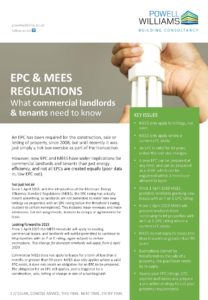Viewpoint: EPC & MEES regulations — what you need to know as a commercial landlord or tenant
Martin Hunt | 4 March 2020
An EPC has been required for the construction, sale or letting of property, since 2008, but until recently it was just simply a tick box exercise as part of the transaction.
However, now EPC and MEES have wider implications for commercial landlords and tenants than just energy efficiency, and not all EPCs are created equally (poor data in, low EPC out).
KEY ISSUES
- MEES only apply to lettings, not sales.
- MEES only apply where a current EPC exists.
- An EPC is valid for 10 years, unless the unit size changes.
- A new EPC can be prepared at any time, and can be prepared as a draft, which can be registered within 3 months or allowed to lapse.
- Since 1 April 2018 MEES prohibits landlords granting new leases with an F or G EPC rating.
- From 1 April 2023 MEES will prevent landlords from continuing to let properties with an F or G EPC rating where a current EPC exists.
- MEES do not apply to leases of less than 6 months or greater than 99 years.
- Exemptions cannot be transferred on the sale of a property, the purchaser needs to re-apply.
- Assess your EPC ratings, EPC expiries and leases and prepare a pro-active strategy to suit your property requirements.
Not just hot air
Since 1 April 2018, and the introduction of the Minimum Energy Efficiency Standard Regulations (MEES), the EPC rating has actually meant something, as landlords are not permitted to enter into new lettings on properties with an EPC rating below the threshold E rating (subject to certain exemptions). This includes lease renewals and lease extensions, but not assignments, licences to occupy or agreements for lease.
Looking forward to 2023
From 1 April 2023 the MEES threshold will apply to existing commercial leases, and landlords will not be permitted to continue to let properties with an F or G rating, again subject to certain exemptions. This change for domestic landlords will apply from 1 April 2020.
Commercial MEES does not apply to leases for a term of less than 6 months or greater than 99 years. MEES also only applies where a valid EPC exists, it does not create an obligation for an EPC to be prepared. The obligation for an EPC still applies, and is triggered by a construction, sale, letting or change in size of a building/unit.
Building Regulations ensure a minimum energy efficiency at construction. MEES only applies to lettings and it is therefore still possible, under current regulations, to sell a building with an F or G EPC rating. MEES would however be a consideration if it was to be rented out, but if it is for owner occupation, MEES would not apply.
Gaps in MEES applying
Under the MEES and EPC regulations, it is also perfectly possible to have a commercial building let before April 2018 on a long lease that continues past April 2023, with an EPC of F or G and not need to do any energy efficiency upgrading works under the regulations, as long as the EPC expires BEFORE 1 April 2023. However, at the time when the building is sold or re-let, then a new EPC will be required and MEES will apply to the new letting or existing letting post April 2023.
Poor data in; poor EPC out
A sub-standard, F or G EPC is not necessarily cause for concern either. While much has been written about EPC ratings going down when they are re-assessed due to the benchmarking in the software becoming more onerous, this presumes that the original EPC had accurate input data.
In practice this was not always the case as typically EPCs were just a perfunctory exercise carried out as cheaply as possible. In the absence of available data, the assessor inputs default data, which in turn results in a lower EPC rating. It has been found that on re-assessment, inputting actual data into the assessment software can result in a higher EPC rating without any actual works being carried out.
Letting strategy
There is always the possibility that some energy efficiency upgrading works have already been carried out, such as new LED lights.
Landlords should therefore be mindful of what fit out their tenants are doing, and pro-actively re-assess their EPCs when the fit out will give the most favourable EPC rating. An EPC lasts for 10 years, or until superseded by a new one or the unit changes size.
Whilst a landlord can let a stripped out shell unit with a valid EPC from a former tenant fit out for the same unit, they will probably not be able to let a newly formed shell unit with no services, as the new EPC will assume default inputs for services, and will probably result in a sub-standard EPC.
Services in the new fit-out will need to comply with Building Regulations, so will be energy efficient and an EPC above the MEES threshold will result post fit-out. A strategy for letting newly formed shell retail units will therefore be required to navigate round the MEES regulations.
FRI Leases
Current opinion is that, under a typical commercial FRI lease, any MEES upgrading works cannot be passed to the tenant. Even the “comply with legislation” clause is considered not to pass the liability to the tenant, as the regulations simply say that the “landlord shall not let or continue to let …. a sub-standard building”.
The regulations do not actually say that any upgrading works are required – it is down to the landlord to decide!
As such the EPC and MEES are now a powerful tool in landlord and tenant negotiations, particularly where a sub-standard EPC exists or could be generated. The existence of or threat of an F or G EPC being produced by the tenant could significantly affect rent review, lease renewal or dilapidations discussions.
Green lease clauses
Newer leases are including EPC clauses that typically restrict tenants from obtaining new EPCs or doing works that adversely affect the EPC. This is clearly a recognition of how powerful EPCs have now become. Yet, there are many existing leases that do not mention EPCs and tenants could use EPCs and MEES to their advantage.
Exceptions
Where a sub-standard EPC exists, landlords can, under certain circumstances, apply for exemption under prescribed grounds. Exemptions apply in their own right and are not a blanket “get out of MEES” card. Any upgrades that can be completed and are not covered by an exemption will need to be completed. Exemptions last for 5 years and need to be registered on the PRS Exemption Register, which is a public record. Exemptions cannot be transferred on the sale of a property.
Scotland’s differing approach
Scotland has decided upon a slightly different route to achieve improvements in energy efficiency, and instead of setting a threshold rating, require a Section 63 assessment to be completed which benchmarks the building energy use against the 2002 Scottish Building Regulations, and any works set out in the report need to be completed.
The Recommendation Report that accompanies an EPC in England & Wales, is generated from a generic list. To get a proper understanding of practical energy efficiency improvement works and the potential EPC rating, then an additional report and assessment is required, often referred to as an “EPC+ Report”.
Get the right EPC assessor
EPC assessors are accredited to carry out EPCs at level 3, 4 or 5, which correlate to the complexity of the building services. Level 3 is simple, single units and Level 5 have very complex building services. A typical multi-let office is Level 4. Level 3 assessors should not assess a complex Level 5 building, but a Level 5 assessor can assess a Level 3 building. The assessor can only assess at the level they are registered, which is stated on the EPC.
Commercial MEES beyond 2023
The government consultation for England & Wales is proposing to raise the MEES threshold for commercial premises to B or C by 1 April 2030, with either a phased incremental increase in the threshold rating between 2023 & 2030 or a cliff edge implementation on 1 April 2030. Current exemptions look set to remain.
The Scottish government is consulting on improving energy efficiency in existing buildings by 2040. There is a clear intent by government to utilise the MEES regulations to achieve their commitment to reduce greenhouse emissions.
A long term approach should therefore be taken and the focus shifted to beyond the current MEES threshold requirement of an E rated EPC in 2023 for commercial rented properties.
How we can help you
Our detailed knowledge of the regulations and the wider commercial property landscape allows us to provide clear, concise advice on this now critical issue to both landlord and tenants.
Whilst, we do not carry out EPC assessments, we have close relationships with skilled EPC assessors within M&E consultancies who can provide robust EPC assessments and EPC+ Reports.
Contact Martin Hunt for more information.
See below to download this article as a factsheet



